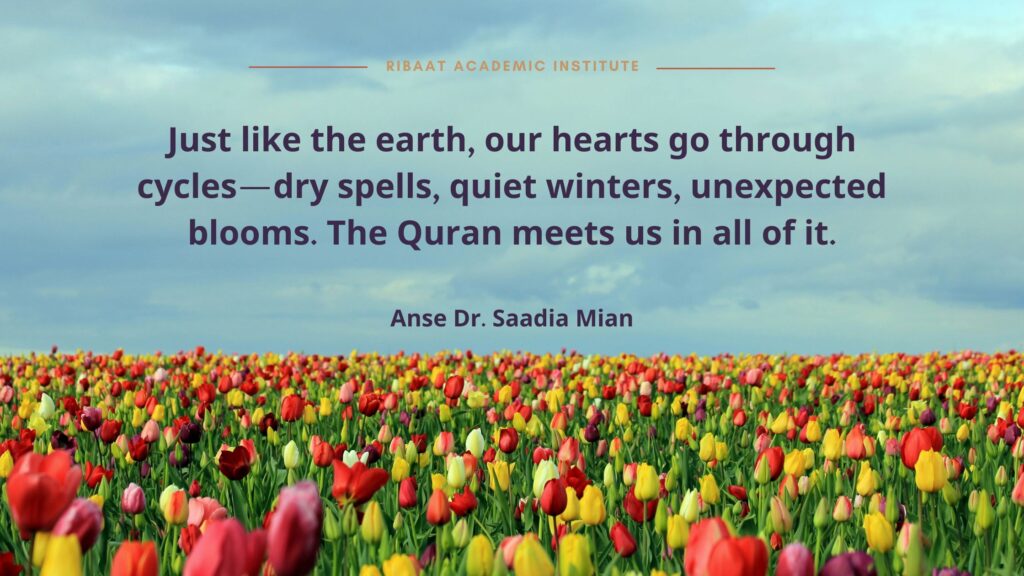For those who live in an area with clear seasons, springtime brings with it hope, relief, a promise of renewal and joy. And with it, comes a beautiful reminder of the dua of the Prophet ﷺ where he ﷺ asks Allah ﷻ to make the Quran the springtime of our hearts:
اللَّهُمَّ اجْعَلِ القُرْآنَ رَبِيعَ قَلْبِي، وَنُورَ صَدْرِي، وَجَلَاءَ حُزْنِي، وَذَهَابَ هَمِّي
“O Allah, make the Quran the springtime of my heart, the light of my chest, the remover of my sorrow, and the reliever of my anxiety.”
This dua, often recited in times of sadness or worry, links the coming of spring to the emotional and spiritual rejuvenation that the Quran can bring.
How is the Quran the springtime of our hearts?
We know that our hearts, which are our core vessels of faith, intention, and consciousness, can oscillate between different states, one extreme being a ‘hardened heart.’
ثُمَّ قَسَتْ قُلُوبُكُم مِّنۢ بَعْدِ ذَٰلِكَ فَهِىَ كَٱلْحِجَارَةِ أَوْ أَشَدُّ قَسْوَةً ۚ وَإِنَّ مِنَ ٱلْحِجَارَةِ لَمَا يَتَفَجَّرُ مِنْهُ ٱلْأَنْهَـٰرُ ۚ وَإِنَّ مِنْهَا لَمَا يَشَّقَّقُ فَيَخْرُجُ مِنْهُ ٱلْمَآءُ ۚ وَإِنَّ مِنْهَا لَمَا يَهْبِطُ مِنْ خَشْيَةِ ٱللَّهِ ۗ وَمَا ٱللَّهُ بِغَـٰفِلٍ عَمَّا تَعْمَلُونَ
“Then your hearts became hardened after that, being like stones or even harder. For indeed, there are stones from which rivers burst forth, and there are some that split open and water comes out, and others that fall down in awe of Allah. And Allah is not unaware of what you do.” (Surat al-Baqara: 74)
This hardening of the heart can be caused by many things, some of which are:
- Persistent sin without repentance: Repeated sin darkens and seals the heart over time.
“Rather, a stain has covered their hearts because of what they used to earn.” (Surat al-Mutaffifin:14)
- Heedlessness (ghaflah): Forgetting Allah ﷻ, neglecting remembrance (dhikr), and being absorbed in worldly distractions.
“Do not be like those who forgot Allah, so He made them forget themselves.” (Surat al-Hashr: 19)
We know from the Quran that good deeds erase bad deeds:
وَأَقِمِ ٱلصَّلَوٰةَ طَرَفَىِ ٱلنَّهَارِ وَزُلَفًۭا مِّنَ ٱلَّيْلِ ۚ إِنَّ ٱلْحَسَنَـٰتِ يُذْهِبْنَ ٱلسَّيِّـَٔاتِ ۚ ذَٰلِكَ ذِكْرَىٰ لِلذَّٰكِرِينَ
“And establish prayer at the two ends of the day and at the approach of the night. Indeed, good deeds erase bad deeds. That is a reminder for those who remember.” (Surat al-Hud: 114)
And we also know from the hadith that the reward for reciting even one letter of the Quran is multiplied:
عَنْ عَبْدِ اللَّهِ بْنِ مَسْعُودٍ، قَالَ رَسُولُ اللَّهِ ﷺ: “مَنْ قَرَأَ حَرْفًا مِنْ كِتَابِ اللَّهِ فَلَهُ بِهِ حَسَنَةٌ، وَالْحَسَنَةُ بِعَشْرِ أَمْثَالِهَا، لَا أَقُولُ: الم حَرْفٌ، وَلَكِنْ أَلِفٌ حَرْفٌ، وَلَامٌ حَرْفٌ، وَمِيمٌ حَرْفٌ”
Abdullah ibn Masʿud (may Allah be pleased with him) reported that the Messenger of Allah ﷺ said:
“Whoever recites a letter from the Book of Allah will receive one good deed as a reward, and that good deed will be multiplied tenfold. I do not say that ‘Alif Lām Mīm’ is one letter, but Alif is a letter, Lām is a letter, and Mīm is a letter.” (Tirmidi, 2910 – Hasan Sahh)
Just like spring brings with it abundant water to wash away the dirt and grime of the winter, so too, the recitation of the Quran provides the spiritual nourishment and cleansing needed to wash away the stains of sin, sorrow, and heedlessness from the heart. In that purified state, the heart becomes like fertile soil—ready to receive and nurture the seeds of humility, gratitude, patience, and love for Allah ﷻ.
As Allah ﷻ says:
“Allah sends down rain from the sky, and with it revives the earth after its death. Indeed, in that is a sign for people who listen.” (Surat an-Nahl:65)
Just as the earth blossoms after rain, so too does the heart come to life through the remembrance and recitation of the Quran.
There are even studies showing the physiological effects of reciting the Quran on the body. Studies suggest that listening to or reciting the Quran can lower heart rate, reduce cortisol levels, and activate the parasympathetic nervous system—the body’s “rest and digest” mode. This calming effect is primarily mediated by the vagus nerve, a central pathway between the brain and body that helps regulate heart rate, digestion, inflammation, and emotional state.
Like the gentle rains of spring that signal to the soil that it’s safe to bloom again, the rhythmic, melodic recitation of the Quran soothes the vagus nerve—slowing the breath, relaxing the muscles, and quieting the mind. It creates what Dr. Herbert Benson called a “relaxation response”—a neurophysiologic shift into peace and presence.
So when we say the Quran is the springtime of the heart, we’re not just speaking in metaphor. It literally shifts the body toward healing.
Just like the earth, our hearts go through cycles—dry spells, quiet winters, unexpected blooms. The Quran meets us in all of it. It softens what’s rigid, clears what’s cluttered, and reminds us of who we are beneath the noise. If you’ve felt far or frozen, you’re not broken—you’re just waiting for spring. And maybe, with one verse at a time, it’s already starting.
Because through every season—grief, growth, stillness, joy—the Quran remains our constant. A living mercy. A steady invitation back to life.
Anse Dr. Saadia Mian, Ribaat Tajwid Instructor

